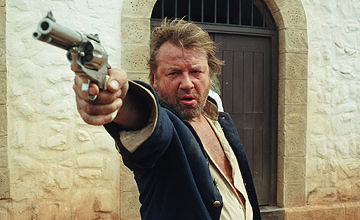Right, yeah….sorry…I forgot to post this earlier today. L.A. Times writer Deborah Netburn asked a bunch of web pundits (myself included) to predict what will happen in 2007.
Day: January 5, 2007
Indy IV analysis from Premiere
A news analysis piece from Premiere.com (submitted by assistant editor Stephen Saito, the former Hollywood Wiretap guy) about the forthcoming Indiana Jones 4 and, perhaps more interesting, a 1989 Nancy Griffin piece in which Steven Spielberg talks about why Indiana Jones and the Last Crusade will be his last Indiana Jones film.
Slamdance pulls Columbine game
The 2007 Slamdance Film Festival has caved in to pressure from certain unnamed moral guardians and agreed to pull the controversial video game Super Columbine Massacre RPG from the finalist pool for its Guerilla Gamemaker Competition. Newsweek‘s Technology and Video Game Editor N’Gai Croal explains what happened.

“The Last Temptation of Christ, Do the Right Thing, Kids, Irreversible. These are some of the most controversial and polarizing films of the last two decades,” he begins. “All of them played at prestigious film festivals like Cannes, Venice or Sundance before their subsequent theatrical releases. Film festival organizers are generally free speech absolutists; the Cannes Film Festival, for example, was created in response to the meddling of the fascist governments in Italy and Germany in the selection of films for the 1938 Venice Film Festival.
“So it came as something of a shock last night to read an exclusive Kotaku report that the Slamdance Film Festival had pulled Super Columbine Massacre RPG.”
“In a last minute phone call Thursday evening,” the Kotaku report states, “Slamdance president and co-founder Peter Baxter told game developer Danny Ledonne that he regards his decision to remove the game from the festival as ‘deeply flawed,’ but necessary to the festival’s survival.

“Baxter went on to say, according to Ledonne, that the festival’s initial decision to select the game was ‘consistent with Slamdance’s philosophy but somewhat naive,’ and apologized profusely for pulling the entry.
“Ledonne said that he bears no ill will toward the festival, but that the decision to pull the game does raise concerns about freedom of speech and video game development.”
Martinets, Ralph Nader
I dropped by the Lakeside Lounge (Avenue B and 10th Street) late last night to catch the the punkish, hard-cranking, Ramones- resembling Martinets, whom I hadn’t seen for a couple of years. The initial lure when I saw them play two years ago was that Magnolia Pictures chief Eammon Bowles is their lead singer and rhythm guitarist. (The others are guitarist Daniel Red, bassist Dave Rick and drummer Roger Murdock.)

IFC’s Ryan Werner, Magnolia Films chief and Martinets’ guitarist and lead vocalist Eammon Bowles at Lakeside Lounge — Thursday, 1.4.07, 11:25 pm
But I went last night knowing that they’re really good — listen to “Shake It Like a Man” — an mp3 is sitting on their MySpace page) — and that Bowles sings and plays like a total rock star.
IFC Films’ Ryan Werner, a Bowles pally for several years, was there also. Werner reminded me that An Unreasonable Man, IFC’s Ralph Nader doc, has been getting shitty mainstream media play so far, and that it deserves better. I missed it at last year’s Sundance Film Festival (Nader didn’t show because his mother had just died) and I guess on some level I didn’t want to see it because Nader basically caused the 2000 election to be won by George Bush, and what a wonderful thing that’s been for everyone. I guess I wanted to get him back by not seeing the doc, but that’s a petty-ass attitude.
Man has been praised by a lot of good people, and I’m making a point of seeing it when I get back to LA. I’ll never forgive Nader for what he did, but this feeling shouldn’t rule the entire roost.
Uni’s weak “COM” campaign
The Hollywood Reporter‘s Nicole Sperling, writing on Anne Thompson‘s Riskybiz blog, feels that Universal “is spending considerably less energy and marketing dollars on an Academy campaign for what many are calling the best film of the year, Alfonso Cuaron‘s Children of Men.
“The film was just released on Christmas Day, so it’s understandable that much of their work is dedicated to the film’s theatrical release.” (It expands to 1200 runs today.) “Still, shouldn’t more of an effort be made to promote this dramatic work of art to the Academy?”
A voice from the “other side of the aisle” has written the following in response:
“The United 93 ad push is a tactic in one [Los Angeles] paper only, whereas Children of Men is getting a nationwide marketing push right now, with both significant print (double trucks today) and television. Also, Children of Men is in the middle of its theatrical publicity campaign, whereas there’s next-to-no residual publicity on United 93.
“The United 93 awards campaign is designed to bring attention to a picture that has been out of the public consciousness for awhile. Children of Men is peaking following a many-months revving up. Sperling didn’t consider (at all) the whole picture.
“As to your first talkbacker, I don’t know what organization he might be in but Children of Men screeners were made available (in plenty of time) to full AMPAS and BFCA membership.”
Beale’s Fresh Contenders
“If you’ve gotten tired of seeing the names Helen Mirren and Forest Whitaker over the past month or so, well, so have I,” rants Reeler columnist Lewis Beale. “Worthy actors, for sure, and most likely Oscar shoe-ins, but the ubiquity of their mentions on Oscar prognostication lists has me feeling like one of those fuming cartoon characters, with steam coming out of my ears.

“How many times have we been told that Marty [Scorsese] might finally win his Best Director statuette, that Dreamgirls‘ Jennifer Hudson is a showstopping Best Supporting Actress contendah or that Volver could be nominated in multiple categories? No surprise that Oscar Season 2006 striking some of us as the Tinseltown equivalent of the famous Casablanca order to ’round up the usual suspects'”
Beale’s response is to nominate some unsung contenders in the major categories — The Proposition for Best Picture (sorry, Lewis, but I hated this film), Casino Royale‘s Daniel Craig for Best Actor, Phyllis Somerville for Best Supporting Actress in Little Children (hear, hear!) , Ashley Judd for Best Actress in Come Early Morning, and Ray Winstone in The Proposition (nope…too skanky & greasy, sorry…I far preferred Ray’s performance in Sexy Beast).
Scott on kids and corporate constraints
I’m once again patting myself on the back for my movie-parenting skills while pointing to a good piece about this topic (and particularly the omnipresence of corporate family fare) from N.Y. Times critic A.O. Scott. (It ran this morning.) He worries that “the dominance of the family film has had a limiting, constraining effect on the imaginations of children. How are [kids] going to grow if the images they see are carefully vetted for safety and appropriateness by the film industry? Parents of America, take your children to the movies you want to see!

“Within reason, naturally. I cringe at the sight of strollers at Apocalypto or Saw III. But I also cringe at the timidity and cautiousness — the hypersensitivity — that confines family viewing to movies with a plush toy or fast food advertising tie-in. At their best, movies not only offer glimpses of fantastic imaginary worlds, but also inklings of what is, for children, the most intriguing and enigmatic world of all: the world of adulthood.”
Two years ago Jett and I co-authored a piece for iVillage editor Beth Pinsker that, when you boiled the snow out of it, was basically about how to raise a film buff. The actual title was “Kazan for Recess? Kubrick for Snack? How to Create a Passion for Film in Your Kids.”

Sample graph: “You can’t necessarily create a cinephile. There’s no protecting them from kids’ programs on TV, which are largely about greed and toy-buying and cheap highs. And you also can’t instruct or guide a kid into loving movies deeply. But you can help to shape their vistas by keeping them away from poor-quality films and by exposing them to the good stuff — and more is better.
“Good films expose kids to intangibles, and once the fundamentals sink in, your kids will respond more to great movies and less to crap on the tube.”
Blu-Ray, HD DVD combos
Finally, the breathtakingly idiotic Blu-Ray vs. HD DVD battle is coming to an end with several announcements that players that can handle both types of discs are about to be offered. “Time Warner has said it will promote an alternative format, called Total HD, that can be used in either Blu-Ray or HD DVD players,” says a recent ZDNet report. “South Korea’s LG Electronics has announced it will release a combo Blu-ray/HD DVD player after months of flip-flopping on the issue. (It plans to provide details this coming Sunday, on the eve of the Consumer Electronics Show in Las Vegas.) Component manufacturers such as NEC and others have begun to prepare parts that could be used in combination players. And Hitachi, which has announced a Blu-ray camcorder, said in October that it wants to look at the issue again.”
Carr explains it all
While trashing the intramural industry attitudes of some of the Left Coasters who’ve dissed David Denby‘s New Yorker piece about Hollywood ‘s digital future while at the same time (almost in the same breath) allowing that Denby’s piece “isn’t that good,” N.Y. Times Oscar blogger David Carr (a.k.as., the Bagger) offers some interesting side-sights:

#1: “Denby’s story is just more Chicken Little hollering about the same old pieces of the sky. iPods, downloads, home theaters — all of them represent additional programming space for an industry that can’t find a place to land a movie that is not based on an ancient sitcom or comic book character. The studios are so busy putting up tents that they haven’t noticed that the ground is shifting under their feet.”
#2: “Meanwhile, a new, if still-nascent, industry, one that will bypass traditional tastemakers and marketers, is growing up of its own accord. And that is a far more interesting story than the blundering of the studios. Digital in, digital out, to be consumed at a time and place and on a device of one’s own choosing. Consu- mer-driven choice, the ultimate capitalist algorithm, will tunnel beneath the studio system.”
#3: “Why is Hollywood so stuck, given that they make a product we can’t resist and the world continues to ingest in spite of our country’s tattered global image? Hollywood is a fundamentally conservative industry. The seven sisters are The Blob that ingests everything — talent, innovation, enterprise. They not only don’t enable innovation, they eat it in hopes it will go away. Anything that comes over the hill is worth shooting at and if doesn’t die, it is ignored.”
#4: “Remember when VCR’s were going to gut the industry? They spun film libraries into gold instead. It was lucrative enough that Sony was able to buy the software — a studio no less — to go with the hardware. And DVD’s, another shot straight to the heart, now serves as the product after the trailers — that blockbuster opener — has come and gone.

#5: “The studios generally treat people with new ideas the way China does, by parking them in padded cells. Mel Gibson gets tagged as a nutter when he taps into a massive Christian market, while Mark Cuban is judged to be an Antichrist when he suggests alternative means of distribution. Audiences, of course, want plain English, the dumber the better, but the impact of films where dialect is rendered in text — Babel, Letters from Iwo Jima and Volver, to mention a few — suggests an increasing consumer openness to a combination of image, text, and sound.”
MPRM and DMT
It’s a good thing that MPRM, a very savvy Hollywood p.r. company co-run by Mark Pogachefsky and Rachel McAllister (and also steered by Michael Lawson and I forget who else…MPRM staffers are always getting stolen by “the dependents”) is growing its digital media and technology division, i.e., DMT.
Things change. I remember sitting in MPRM’s offices about five or six years ago and looking at piles of clippings they had assembled to show some heavyweight Hollywood client, and every last one was from a print publication — not one print-out from an entertainment website.
I haven’t smoked DMT (i.e., dimethyltryptamine) since I was in my late teens. I remember trying it with two friends at the home of some macho blowhard guy I didn’t know — a guy who was boasting that he’d seduced a girl he’d just met after only two dates. The guy called the chunks of DMT we were about to smoke “little ratshit.” And then he toked up. In less than a minute he was starting to freak. He started rubbing the couch he was sitting on and going “uh-ohhh” and making odd little acck noises.
